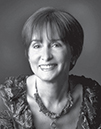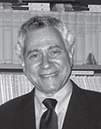
Wendy Jacobson
INSTITUTE ADVISORY & CONSULTATION SECTION
Institute Advisory & Consultation Section of the DPE (IACS)
Wendy Jacobson and Jay S. Kwawer
Wendy Jacobson, M.D., and Jay S. Kwawer, Ph.D., are IACS co-chairs. Jacobson (wjaco02@emory.edu) is training and supervising analyst and an associate director at Emory University Psychoanalytic Institute. Kwawer (kwawer@wawhite.org) is training and supervising analyst and director emeritus at the William Alanson White Institute.

Wendy Jacobson

Jay S. Kwawer
Issues of concern inevitably arise in the life of any institute. An outside ear can be beneficial in illuminating the nature of the problem and in devising strategies for dealing with these concerns. The Institute Advisory & Consultation Section (IACS) of the Department of Psychoanalytic Education (DPE) offers such assistance. IACS provides an ongoing liaison to each institute and can also provide consultation teams, if needed and requested. Both are benefits offered, without charge, for all 32 affiliated APsaA institutes and centers.
We have no regulatory or supervisory function and our goal is to find ways to support our colleagues and help institutes express their vision and mission.
As reflected in our name, our role is explicitly advisory and consultative. We have no regulatory or supervisory function and our goal is to find ways to support our colleagues and help institutes express their vision and mission. We strive to add the benefit of resources and knowledge gained from national and international experience, while helping to discern general trends with which institutes may need assistance. Importantly, we also want to identify “best practices” that can be shared nationally. Likewise, we are alert to broad-scale changes more generally; e.g., distance learning; theoretical and technical advances; and revised educational models suited to modern-day training and a broad range of candidate backgrounds.
IACS also aims specifically to help the DPE establish and nurture a more personal relationship with each institute and to know each other better. IACS liaison representatives seek to establish a trusted collegial consultative and advisory relationship with each APsaA institute. This may identify that the help of a consultative team would be desirable or function to diminish the need for an extended consultation visit by working on problems early. The liaison representative strives to get a sense of the major and emerging issues at each institute and provides information about the kind of assistance APsaA can offer; e.g., from other DPE sections such as Training & Education, Child Analysis, Community Outreach, Scholarship, Psychotherapy Education, Interdisciplinary Relations, Research, Diversities; and APsaA as a whole. With confidentiality and tact, liaison representatives work to create a hands-on, reciprocal loop between the local and national levels. Through these efforts, we hope to generate robust local interest and participation in APsaA by engaging the younger generation as well as the middle and mature ones.
Most of our liaison work is conducted by phone, videoconference and email. Additionally, we have a rotating schedule of liaison visits to institutes at a mutually convenient time, perhaps when the institute has organized a retreat or a major institute meeting. Our budget permits supporting travel expenses for each liaison to make a personal visit approximately once every five years. Also, we encourage liaisons to get together with relevant members of their institutes at the national meetings whenever possible.
Consult teams provide more intensive help for entrenched issues and problems, involving on-site visits as well as technology assisted communication. We can provide help that is focal, intermediate or comprehensive in scope—the latter being akin to the former site visits, gathering information about the institute or center with which they are working, but without designated regulatory function.
Targeted Goal
Our goal is to be tailored, nimble, and responsive to the needs of each institute, always with an appreciation that the needs of each may differ from all others. Some have remarked that IACS combines the functions formerly served by the Committee on New Training Facilities (CNTF), Committee on Collaborative Institute Development (CCID), and Committee on Institutes (COI), again, without imposing any regulatory mandates.
Responding to Requests for Help
IACS aims to demonstrate to APsaA institutes that it can be helpful, and not to coerce institutes into feeling they must call on us. If you want a 360-degree review of your program, akin to a former COI site visit, we can provide it. If you have a complex focal or intermediate issue you would like us to help you with, we will focus our listening intensively around finding solutions. If you want consultative reflection on an issue at your institute, your liaison representative is available for this and for consultation or brainstorming in general. Your liaison will also help assess when more intensive help is needed, and collaboratively arrange for a consult team if it is.
Another IACS function is to disseminate useful information. As but a few examples, we circulated a paper Richard Tuch of the DPE Scholarship Section wrote on “Distilling the Essence of Treatment” in case reports. At the June meetings, Rick Hall from San Diego shared a video of Kerry Kelly Novick discussing how to integrate adult and child curriculum, conceptualizing herself as a “life cycle analyst.”
The range of issues that have come our way has been varied, despite our relative infancy as a Section of DPE since the APsaA reorganization. Some relate to candidate recruitment or dropout, or thorny candidate issues that arise during training; others to governance struggles, survival issues or growing pains, educational program design, personal analyst or TA system, bullying and discrimination—the list goes on. We bring in experts when needed to help with specific problems.
We have liaisons and consulting teams working with affiliated institutes who have asked for help dealing with serious organizational problems. We understand it is likely there are differences of opinion within institutes about the need for such engagement. Sometimes, we consider “resistances to consultation” as an important and inevitable phenomenon and our work includes addressing these obstacles, often through conceptualizations refined and revised collaboratively and by working assiduously to establish an atmosphere of safety and trust.
Though we are early in our existence, we’ve gotten positive reviews. One institute said we helped alleviate major tensions sufficiently to save it—literally—from extinction, helping to find a viable path forward. Another feels we helped conceptualize a thorny issue so leadership could move forward with taking necessary measures, including structural reforms.
Our IACS roster represents a mix of seasoned and younger members across a wide geographical range and array of backgrounds, theoretical orientations, and diversities. We include candidate members explicitly and seek representation from every institute. We hope over time that institutes will avail themselves ever more fully of our services.